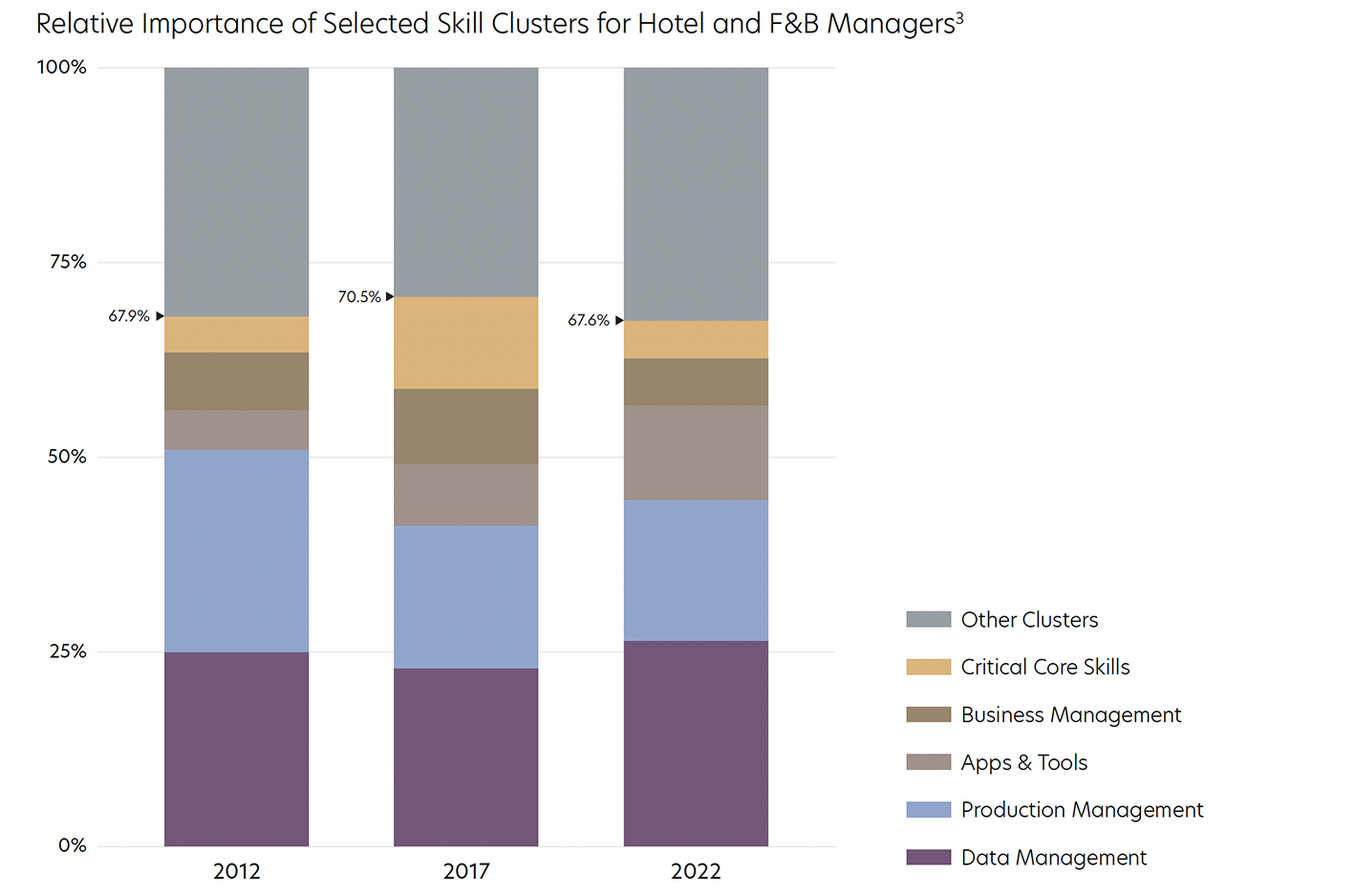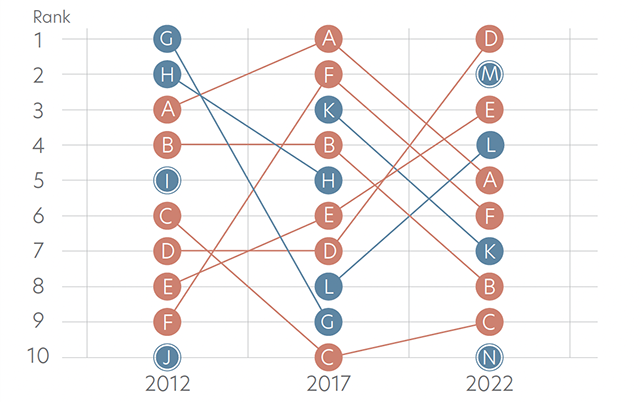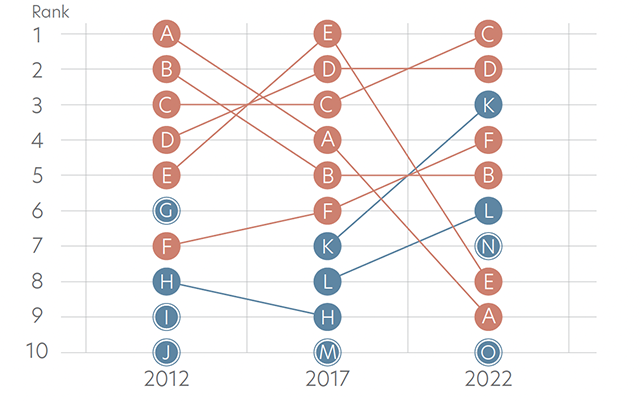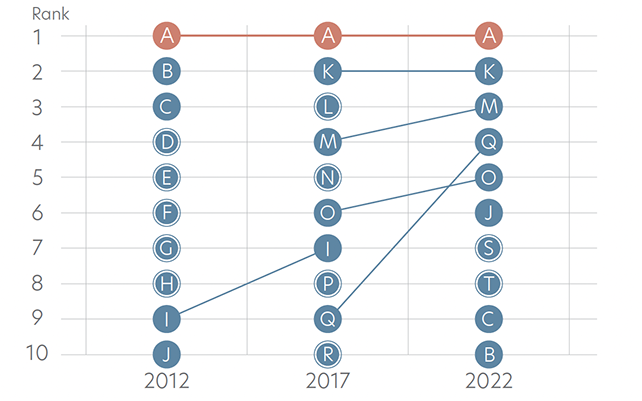Hotels and F&B Managers
 3Based on Singapore Standard Occupational Classification (SSOC) code 141: ‘Hotel and food and beverages services managers’.
3Based on Singapore Standard Occupational Classification (SSOC) code 141: ‘Hotel and food and beverages services managers’.
There is an increasing requirement for Data Management skills and the use of digital Apps & Tools for hotel and F&B managers.
In 2022, the hiring demand for hotel and F&B managers was at 8,367 job posts, which is moderate. The hiring demand is likely driven by the resumption of the tourism industry and growing need for hotel and F&B managers to oversee the
operations of hotels, restaurants, and other food service establishments.
Examples of job roles in this job family include:
- Hotel operations/lodging services managers
- Restaurant managers
- Catering managers
The total relative importance of the Data Management, Production Management, Apps & Tools, Business Management clusters and CCS remained almost unchanged from 67.9% in 2012 to 67.6% in 2022.
CCS increased in relative importance for this job family, from 4% in 2012 to 11.0% in 2017, but decreased to 4.4% in 2022. Overall, this cluster increased in relative importance for this job family. Amongst the top five demanded CCS for this job family, Communication, Collaboration, Problem Solving and Creative Thinking also appeared in the top five demanded skills for the Singapore economy.
The top 10 demanded skills in the Data Management cluster experienced changes over the past decade. Critical Thinking, Customer Data Analysis, and Data Protection Management are skills that became more important in 2022.
Top Ten Demanded Skills in the Business Management Cluster

Titles of skills featured in this chart
- Human Resource Digitalisation*
- Applications Support and Enhancement*
- Automation Research and Implementation*
- Big Data Analytics*
- Programming and Coding*
- Business Environment Analysis
- Market Research
- Engineering Problem Solving
- Data Engineering
- Business Environment Analysis
- Data Protection Management
- Customer Data Analysis*
- Critical Thinking
- Financial Analysis
Circles with outer rings denote skills that only appeared once. The complete list of skills covered, with full descriptions, is provided at the end of the chapter.
* Denotes
skills that also appear in the top 10 demanded skills in the Data Management cluster in the
Singapore economy in 2022.
Skills that are consistently in the top 10 list in 2012, 2017 and 2022:
- Big Data Analytics: Analyse large datasets to find patterns and trends
- Programming and Coding: Write code to create software programs
- Human Resource Digitalisation: Innovate HR processes through digitalisation
- Business Environment Analysis: Analyse data to understand the business landscapes and environments
- Applications Support and Enhancement: Provide technical support and enhancements to applications
- Automation Research and Implementation: Automate processes using equipment and information technologies
Skills that appeared in 2022 but did not consistently appear in the top 10 list in 2012 and 2017:
- Critical Thinking: Analyse issues, ideas, and reasoning from multiple perspectives
- Customer Data Analysis: Analyse customer data to understand customer behaviours
- Data Protection Management: Develop and implement data protection programs
- Financial Analysis: Analyse financial statements and data to understand the financial performances of organisations
The top 10 demanded skills in the Production Management cluster experienced changes over the past decade. Equipment Maintenance, Power Quality Management, and Quality Assurance and Audit became more important in 2022.
Top Ten Demanded Skills in the Production Management Cluster for hotel and F&B managers

Titles of skills featured in this chart
- Operation Management*
- Asian Cuisine Preparation and Cooking
- Quality Assurance*
- Standard Operating Procedures Development*
- Continuous Improvement Management*
- Maintenance Scheduling
- Food Science Application
- Preventive Maintenance Management
- Maintenance and Repair
- Mechanical Engineering Management
- Equipment Maintenance
- Food and Beverage Equipment Maintenance
- Process Control
- Power Quality Management*
- Quality Assurance and Audit
Circles with outer rings denote skills that only appeared once. The complete list of skills covered, with full descriptions, is provided at the end of the chapter.
* Denotes skills that also appear in the top 10 demanded skills in the Data Management cluster in the Singapore economy in 2022.
Skills that are consistently in the top 10 list in 2012, 2017 and 2022:
- Quality Assurance: Develop and implement quality standards
- Standard Operating Procedures Development: Implement and enforce standard operating procedures
- Maintenance Scheduling: Plan and manage maintenance schedules while following standards
- Asian Cuisine Preparation and Cooking: Prepare and present Asian cuisine dishes
- Continuous Improvement Management: Improve processes and procedures
- Operation Management: Manage manufacturing operations
Skills that appeared in 2022 but did not consistently appear in the top 10 list in 2012 and 2017:
- Equipment Maintenance: Maintain tools and equipment and improve their performances
- Food And Beverage Equipment Maintenance: Maintain food and beverage tools and equipment and improve their performances
- Power Quality Management: Investigate electricity supply issues
- Quality Assurance and Audit: Carry out security audits
The top 10 demanded Apps & Tools changed significantly over the past decade. Apps & Tools related to programming languages became more important in 2022.
Top Ten Demanded Apps & Tools for hotel and F&B managers

Titles of skills featured in this chart
- Microsoft Office (Excel)
- Java*
- SQL*
- .NET
- Oracle WebLogic
- COBOL
- IBM Db2
- J2EE
- CRM Systems
- Microsoft Office (Word)
- CSS2/CSS3*
- Job Control Language
- Process Control
- HTML4/HTML5
- Microsoft Office (PowerPoint)*
- Javascript
- Visual Basic (VB)*
- PLC Programming
- Python*
- Alfresco
Circles with outer rings denote skills that only appeared once
* Denotes
skills that also appear in the top 10 demanded skills in the Data Management cluster in the
Singapore economy in 2022.
Apps & Tools that are consistently in the top 10 list in 2012, 2017 and 2022:
- Microsoft Office (Excel): Spreadsheet software
Apps & Tools that appeared in 2022 but did not consistently appear in the top 10 list in 2012 and 2017:
- CSS2/CSS3: Style sheet language
- Moz (SEO): Search engine optimisation tool
- Visual Basic (VB): Programming language
- Microsoft Office (PowerPoint): Presentation software
- Microsoft Office (Word): Presentation software
- Python: Programming language
- Alfresco: Information management software for Windows and UNIX
- SQL: Database language
- Java: Programming language
Profile Story
Kung Teong Wah
General Manager in a hotel and F&B company
Having worked his way from the kitchen as an executive chef into the boardroom as the general manager, Kung Teong Wah developed his career in the hospitality and F&B sectors. His responsibilities are massive, managing a hotel with 346 rooms, two restaurants, a cocktail bar, and a large banquet.
The evolution of hospitality, F&B and essential skills
Over the years, Teong Wah has seen the hotel and F&B sectors evolve alongside the proliferation of digital technologies and data-driven insights.
Teong Wah elaborates, “When speaking with hotel owners from an older generation, we talk about things the industry traditionally looks at, like service quality and occupancy rates. In contrast, hotel owners in their 30s want to know about digitalisation strategies, using data to drive channel revenue through marketing , and more. Having the experience and digital fluency to connect with hotel owners of both generations is a big advantage.”
Speaking about the skills that hospitality and F&B professionals need in the years ahead, Teong Wah highlights Developing People, Creative Thinking, Problem Solving, and Change Management as essential for management personnel. He then lists Communications, Customer Orientations, Learning Agility, and Digital Fluency as necessary skills for staff to be competitive in a digitalised economy.
Roadmaps for digitalisation and upskilling
In Teong Wah’s opinion, the keys to building successful hotel and F&B outlets lie in roadmaps. Specifically, digital roadmaps for the hotels’ technology investments, and skills roadmaps for staff to improve their skills and salary.
“In a modern hotel, a digital roadmap helps plan the investments to make in the hotel’s technologies, possibly over the next 10 years. It’ll also ensure that all the technologies in the hotel are properly integrated, so work can flow seamlessly.
“For instance, we make innovative use of robots to deliver amenities, towels and ordering of in-room dining to guests’ rooms and this is only possible with end-to-end integration of our hotel room tablets, doorbells, guest room management system, elevators, and more. Failing to plan this entire chain properly could lead to bad technology investments that may hold us back for the next decade.”
Teong Wah also recognises that low salaries and ‘unsexy’ job roles like ‘waiters’ are key reasons why his industries lose their best talents. His solution is pragmatic, “We focus on capacity building and job redesign, especially with our front-end staff, so they can take on bigger job roles of higher value and are more fulfilling. We incentivise them to learn new skills, take on more responsibilities and reward them with the higher salaries that their expanded roles deserve.”
Thriving in a rapidly evolving environment
Sharing his thoughts on staying relevant in an environment that is continuously changing, Teong Wah reflects, “The days of lifetime employment in one career are behind us. Today, we can embrace technology and use it to our advantage.
“The good news is that we live in a country with an incredibly comprehensive training ecosystem. Take advantage of it and use your SkillsFuture Credit to stay relevant; in the career you have today, and the one you could be in tomorrow.”
We greatly appreciate your feedback on the report here.